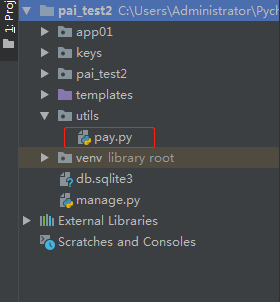from django.contrib import admin
from django.urls import path
from app01 import views
urlpatterns = [
path('admin/', admin.site.urls),
path('/update_order/', views.update_order),
path('/pay_result/', views.pay_result),
path('test/', views.TestView.as_view()),
]
from django.shortcuts import render, redirect, HttpResponse
from rest_framework.views import APIView
from django.views.decorators.csrf import csrf_exempt
from rest_framework.response import Response
import time
from utils.pay import AliPay
# Create your views here.
def aliPay():
obj = AliPay(
appid="2016101600700776",
app_notify_url="http://127.0.0.1:8000/update_order/ " , # if successful payment, Alipay will send a POST request to the address (check whether the payment has been completed)
return_url = " http://127.0.0.1:8000/pay_result/ " , # if the payment is successful, redirected back to the address of your website.
alipay_public_key_path = " Keys / alipay_public_2048.txt " , # Alipay public
app_private_key_path = " Keys / app_private_2048.txt " , # application private
Debug = True, # default False,
)
return obj
class TestView (APIView):
DEFGET (Self, Request, * args, ** kwargs):
return the render (Request, ' test.html ' )
DEF POST (Self, Request, * args, ** kwargs):
# price, the purchase of merchandise encryption
# spliced into URL
alipay = aLIPAY ()
# of encrypting data for later
Money = a float (request.POST.get ( ' . price ' ))
out_trade_no = " X2 " + STR (the time.time ())
# 1. Create a data in the database : state (to be paid)
query_params = alipay.direct_pay (
Subject =" Mark Crazy English " , # commodity simple description
out_trade_no = out_trade_no, # Merchant order number
TOTAL_AMOUNT = Money, # transaction amount (unit: RMB reserved previous two decimal places)
)
pay_url = " https://openapi.alipaydev.com/gateway. {} do? " .format (query_params)
return redirect (pay_url)
DEF pay_result (Request):
" ""
after the payment is complete, jump back to the address
: param Request:
: return:
"" "
params = request.GET.dict ()
Sign = params.pop ( 'sign' , None)
alipay = ALIPAY ()
Status = alipay.verify (params, Sign)
IF Status:
return HttpResponse ( ' pay for success ' )
return HttpResponse ( ' pay for failure ' )
# a view csrf_exempt = annotation can be used to identify cross-domain access.
@csrf_exempt
DEF update_order (request):
"" "
after successful payment, pay treasure pOST request sent to the address (used to modify the order status)
: param request:
: return:
" ""
IF request.method == ' pOST ' :
from urllib.parse import parse_qs
body_str = request.body.decode('utf-8')
post_data = parse_qs(body_str)
post_dict = {}
for k, v in post_data.items():
post_dict[k] = v[0]
alipay = aliPay()
sign = post_dict.pop('sign', None)
status = alipay.verify(post_dict, sign)
if status:
#Modify the order status
out_trade_no = post_dict.get ( ' out_trade_no ' )
Print (out_trade_no)
# 2. order number data in the database will be updated according to the
return HttpResponse ( ' pay for success ' )
the else :
return HttpResponse ( ' pay for failure ' )
return HttpResponse ( '' )
from datetime import datetime
from Crypto.PublicKey import RSA
from Crypto.Signature import PKCS1_v1_5
from Crypto.Hash import SHA256
from urllib.parse import quote_plus
from urllib.parse import urlparse, parse_qs
from base64 import decodebytes, encodebytes
import json
class AliPay(object):
"""
支付宝支付接口(PC端支付接口)
"""
def __init__(self, appid, app_notify_url, app_private_key_path,
alipay_public_key_path, return_url, debug=False):
self.appid = appid
self.app_notify_url = app_notify_url
self.app_private_key_path = app_private_key_path
self.app_private_key = None
self.return_url = return_url
with open(self.app_private_key_path) as fp:
self.app_private_key = RSA.importKey(fp.read())
self.alipay_public_key_path = alipay_public_key_path
with open(self.alipay_public_key_path) as fp:
self.alipay_public_key = RSA.importKey(fp.read())
if debug is True:
self.__gateway = "https://openapi.alipaydev.com/gateway.do"
else:
self.__gateway = "https://openapi.alipay.com/gateway.do"
def direct_pay(self, subject, out_trade_no, total_amount, return_url=None, **kwargs):
biz_content = {
"subject": subject,
"out_trade_no": out_trade_no,
"total_amount": total_amount,
"product_code": "FAST_INSTANT_TRADE_PAY",
# "qr_pay_mode":4
}
biz_content.update(kwargs)
data = self.build_body("alipay.trade.page.pay", biz_content, self.return_url)
return self.sign_data(data)
def build_body(self, method, biz_content, return_url=None):
data = {
"app_id": self.appid,
"method": method,
"charset": "utf-8",
"sign_type": "RSA2",
"timestamp": datetime.now().strftime("%Y-%m-%d %H:%M:%S"),
"version": "1.0",
"biz_content": biz_content
}
if return_url is not None:
data["notify_url"] = self.app_notify_url
data["return_url"] = self.return_url
return data
def sign_data(self, data):
data.pop("sign", None)
# 排序后的字符串
unsigned_items = self.ordered_data(data)
unsigned_string = "&".join("{0}={1}".format(k, v) for k, v in unsigned_items)
sign = self.sign(unsigned_string.encode("utf-8"))
# ordered_items = self.ordered_data(data)
quoted_string = "&".join("{0}={1}".format(k, quote_plus(v)) for k, v in unsigned_items)
# 获得最终的订单信息字符串
signed_string = quoted_string + "&sign=" + quote_plus(sign)
return signed_string
def ordered_data(self, data):
complex_keys = []
for key, value in data.items():
if isinstance(value, dict):
complex_keys.append(key)
# 将字典类型的数据dump出来
for key in complex_keys:
data[key] = json.dumps(data[key], separators=(',', ':'))
return sorted([(k, v) for k, v in data.items()])
def sign(self, unsigned_string):
# 开始计算签名
key = self.app_private_key
signer = PKCS1_v1_5.new(key)
signature = signer.sign(SHA256.new(unsigned_string))
# base64 编码,转换为unicode表示并移除回车
sign = encodebytes(signature).decode("utf8").replace("\n", "")
return sign
def _verify(self, raw_content, signature):
# 开始计算签名
key = self.alipay_public_key
signer = PKCS1_v1_5.new(key)
digest = SHA256.new()
digest.update(raw_content.encode("utf8"))
if signer.verify(digest, decodebytes(signature.encode("utf8"))):
return True
return False
def verify(self, data, signature):
if "sign_type" in data:
sign_type = data.pop("sign_type")
# 排序后的字符串
unsigned_items = self.ordered_data(data)
message = "&".join(u"{}={}".format(k, v) for k, v in unsigned_items)
return self._verify(message, signature)

